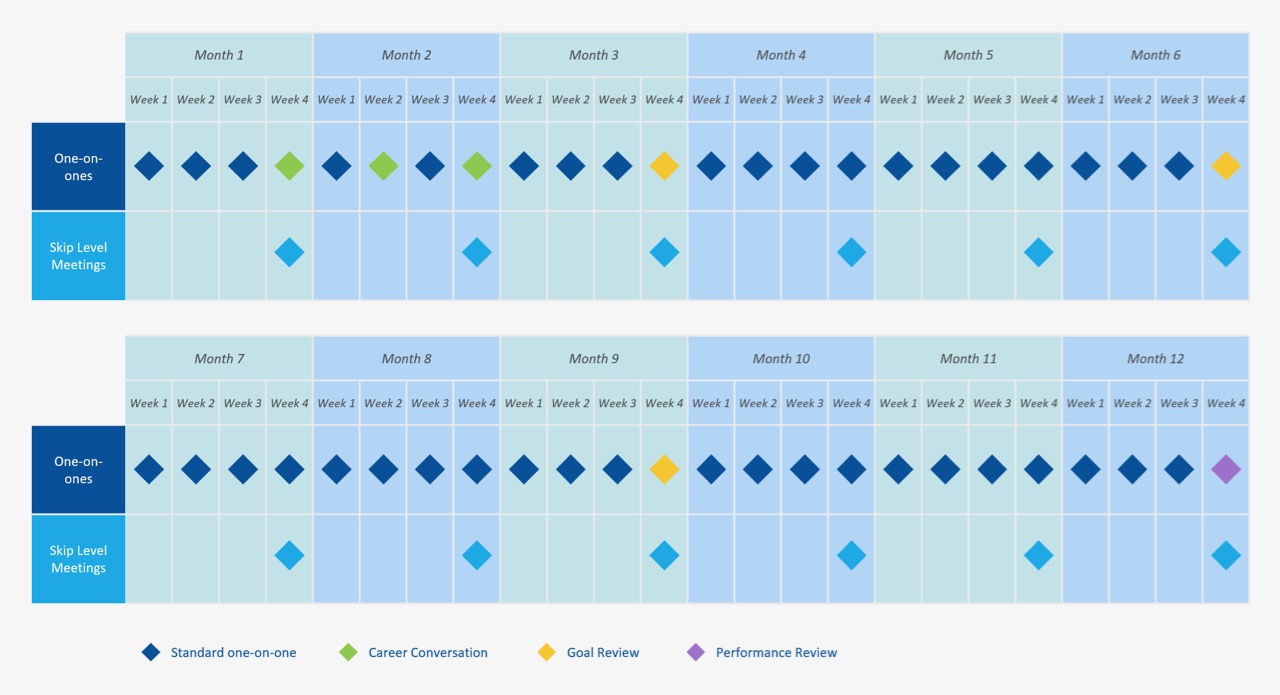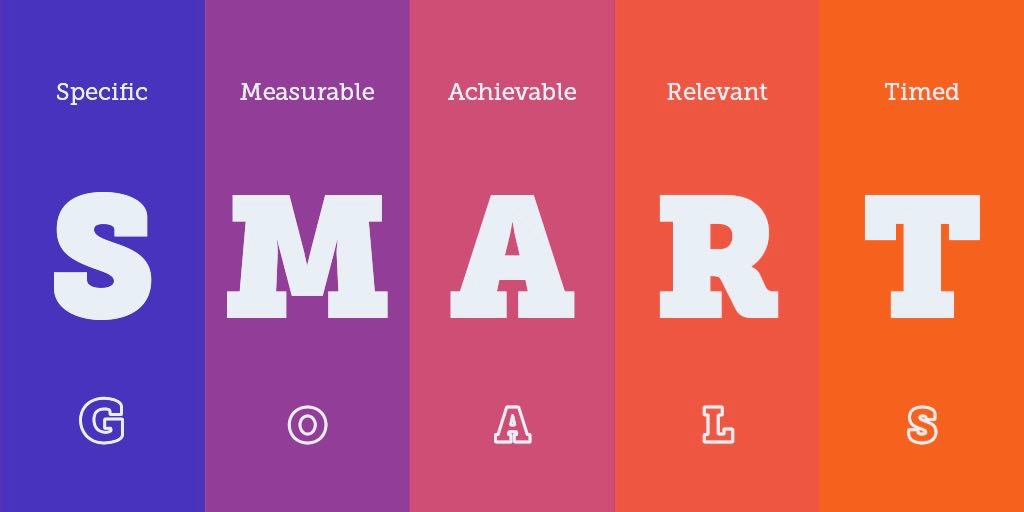Essential Meetings to Have With Your People as a Manager
When I first started managing, I had no idea what meetings I was supposed to conduct with my staff to help them grow. In part because I was at a smaller organization and we were inventing processes on the fly and also because I did not have a manager who conducted or introduced me to these meetings. I learned about these meetings through years of experience, peers in other organizations, networking, mentors, and reading. A lot of reading!
I’ve written this article to provide an introduction to - and a set of resources for - essential meetings that managers should have with their people to provide guidance, feedback, coaching, and support that helps them grow.
These are the meetings I wish I knew about - and knew how to conduct - when I first became a manager.
What this article is and isn’t
Management cannot be boiled down to a few articles, slogans, and a TLDR. Management is comprehensive. It is not piecemeal. It takes an array of alchemy to build a strong team. With that said, this article is an introduction to key meetings we should be having as managers while providing additional resources to help you learn more.
So how should you use this article? Read about the meetings, check out the additional resources, and try it out. Experience is the best teacher!
The Essential Meetings
For each meeting I highlight its purpose, provide an overview, outline key details, and share some additional resources to help you learn more.
To fight meeting proliferation, I conduct these meetings during the scheduled one-on-one meeting time.

So, for example, when you have a “goal review” meeting or a “career development conversation” this can (and should) be held during your standard one-on-one time. Another reason why the one-on-one meeting is the foundation.
One-on-ones
Purpose: To provide support, coaching, and candor that helps your direct report grow, succeed, and excel.
Overview:
The reigning, defending, undefeated meeting of the (management) world! The one-on-one. Yeah, the champ is here!
One-on-ones (i.e. 1-1s) are the most valuable tool in your management utility belt and the most essential meeting to have with your direct report. These meetings help you remove roadblocks, coach, mentor, and develop your people - empowering them to become the most bad-ass versions of themselves!
Yeah, these meetings are essential.
Fundamentally, one-on-ones (as with every meeting outlined) are for the employee, it is their meeting. Listen, ask questions, and be present. Conduct them in private and ensure a safe space.
One-on-ones help us empathize, connect with, and better understand our direct reports - creating an enriched working environment and enhanced sense of belonging. Through one-on-ones we can also gain informal feedback and address morale issues, while ensuring better engagement, productivity, and reduced turnover.
Conducting effective one-on-ones is the single most important investment you can make in your team.
One-on-ones are the lifeblood of an open, healthy, and effective working relationship. The other meetings outlined in this article flow out of this one. If you are having great one-on-ones it will make the other meetings that much more productive!
Agenda and topics:
- The agenda is driven by the direct report.
- Here is a great link to share with your direct reports on preparing for an effective one-on-one with your manager
- As a manager come prepared with questions; listen, take notes, keep promises, and follow up
- Topics include: priorities, roadblocks, accomplishments, frustrations, feedback, and what is “top of mind” for your direct report; it is not a status update
Frequency: weekly, bi-weekly (based on task relevant maturity)
Meeting Length: 30-60 minutes
Additional Resources:
- Questions for our first 1:1
- One-on-one meeting dos and don’ts
- Working the weekly 1:1
- The 8 best questions to ask during a one-on-one meeting
- One-on-one resources
Skip Level Meetings
Purpose: To help your managers become better bosses, build a rapport with your teammates, and get organizational/team feedback to improve the work environment.
Overview:
Skip Level Meetings are an invaluable tool that helps you keep a pulse on the organization with the ultimate goal to make things better.
When you are a manager of managers it is important to understand:
- How are your managers performing?
- How are people doing under your managers?
- What do people think/feel about the organization?
- Are there any process/performance issues that are being “managed up”, which you do not have insight into?
If you have ever asked one of these - or related - questions, then welcome to the skip level meeting! For skip level meetings you meet with the direct reports of your managers with the goal of helping each of your managers become better bosses and making sure people on their team feel comfortable giving feedback directly. In addition, you are building trust and working to improve the work environment.
When gathering feedback, there are few key points to highlight:
- Ensure safety and anonymity - team members must be able to speak their minds without fear of retribution
- Tell your managers you are having them
- Work with your managers to inform their direct reports you will be conducting these meetings
Agenda and topics:
- The primary topic/goal of this meeting is to obtain feedback about your managers, the organization, and/or team in general.
- As a manager come prepared with questions; listen, take notes, keep promises, and follow up
- Note: this is not a “witch-hunt” or “gotcha” meeting, the intent is to utilize these meetings as a way to improve your managers and the overall organization
Frequency: monthly, quarterly
- Note: Plan ahead to schedule these meetings - If you have a large team you will have to spread these meetings out. At times I have also conducted group skip level meetings and brought a team of one of my manager’s direct reports to lunch to chat about the organization and areas in which we can improve.
Meeting Length: 30-60 minutes
Additional Resources:
Career Conversations
Purpose: To further get to know your direct reports, learn their aspirations, and plan how to help them reach those dreams.
Overview:
Career conversations are ongoing discussions that help you identify your direct report’s professional goals and the steps needed to achieve them. The three conversations involve their life story (past), dreams (present), and developing a career action plan (future).
Once we understand what motivates our people and what their goals are, we can help them achieve them.
While performance reviews are backward looking, career development conversations are forward facing.
But wait, I hear you saying, what if their career goals don’t align with the position or the company’s trajectory? Won’t asking about these goals create dissonance between this person and the organization?
Whoa, whoa, whoa! If that dissonance exists, it exists independent of these meetings. Wouldn’t it be great to acknowledge any dissonance before this person is demotivated or worse and starts looking for (or actually takes) another opportunity? Wouldn’t it be wonderful to better align their role and responsibilities with their motivations and dreams?
I believe our role as managers is to help each member of our team be the most awesome version of themselves and support them on this journey. Career conversations are a critical tool that helps get us there.
Agenda and topics:
- Conduct three ~60 minute conversations 2 weeks apart
- Meeting One: Life Story - take an hour to get to know your employees
- Meeting Two: Dreams - find their lighthouse, bring it into focus
- Meeting Three: Career Action Plan - lay out the beacons to their lighthouse
- Use this template as a guide to the three conversations and see the additional resources below for further details.
- Note: Using the goal review meeting is a great way to ensure we are tracking accurately on our Career Action Plan.
Frequency: 3 conversations, approximately 2 weeks apart from each other.
Meeting Length: 60 minutes (a total of about 180 minutes for all three meetings)
Additional Resources:
- Three Powerful Conversations Managers Must Have To Develop Their People
- Radical Candor
- Career Conversations from radicalcandor.com
- The Problem with Career Conversations (and how to improve them!)
- How to have career conversations with your employees
- Meeting Template
Goal Reviews

Purpose: To review your direct report’s current goals and ensure they are accurately tracking towards them.
Overview:
Have you ever had a performance review where you set up shiny new goals for the upcoming year only to never review them again until the next performance review? What about the career conversations where you outlined that amazing 18 month plan, but haven’t discussed it since?
Maybe priorities changed throughout the year (they will) or maybe now a new strategic initiative needs to be added to the roadmap (it will). Things that seemed so important in January may have turned irrelevant in June. How do you ensure alignment between the company vision and team goals with your direct report’s personal aspirations and motivations?
I have found the best way to do this is to dedicate time specifically to review the agreed upon objectives, discuss the career action plan, and ensure we are properly tracking towards the goals.
Agenda and topics:
- Review the current set of goals, have your direct report self-review as well. How are they progressing toward their goals?
- Recalibrate the career action plan as needed
- Note: this is not about adding goals, but about ensuring we are supporting our people to reach their goals and dreams
- Are the goals (S)pecific, (M)easurable, (A)chievable , (R)elevant, (T)ime specific?
- Update the action plan as needed to ensure they are reaching their goals. Some examples may include:
- Do they need to spend more time coding? Remove unnecessary meetings.
- Are their technical skills not growing as expected? Ensure code review! Share books, links, harder projects.
- Is there too much on their plate? Remove roadblocks, help them with time management.
- Have they not had a chance to lead a project as expected? Be sure to carve one out, delegate one of yours!
- Have they not had an opportunity to build their network? Find some meetups to share with them, introduce them to additional mentors.
- What are they doing to help themselves improve and grow?
Frequency: monthly (with more junior people or people new to their role), quarterly (with more senior/experienced staff); use task relevant maturity as a guide.
Meeting Length: 30-60 minutes (dependent on frequency). If monthly, 30 minutes. If quarterly, allocate more time as necessary.
Additional Resources:
- Making Sure Your Employees Succeed
- 7-tips-for-effective-employee-goal-setting
- How to write SMART goals
Performance Reviews
 (do not be this manager!)
(do not be this manager!)
Purpose: To improve your direct report’s performance.
Overview:
So we are at the last essential meeting…and why did I put it last? Because it comes at the end of the year? Nah. Because I believe this meeting, while important, is augmented, supported by, and builds upon the previously outlined meetings. Ongoing performance management consists of frequent touch-bases (e.g. one-on-ones), guidance, and review (e.g. career conversations and goal reviews).
In some companies, performance reviews are a dying breed. Some companies like Adobe, GE, and others, got rid of the performance review, so should we follow and just ditch it? From my standpoint, no. Performance reviews are critical.
I do not dismiss performance reviews out of hand. I have received performance reviews with feedback that has helped me grow significantly as a manager and leader. I have also given reviews that have helped people grow tremendously. I have also failed at them as well.
With that in mind, here is some advice for conducting productive performance reviews:
- Give yourself plenty of time to write these reviews. It will take time to gather feedback, speak to peers, review your notes, and draft the full review.
- Keep notes throughout the year. When this person excels or performs below expectations on a task/goal/expectation make note of it. When you receive feedback on this person from their peers or other managers, make note of it.
- Have a concrete example for each piece of feedback. Feedback without an example does not resonate and from my experience can come across like an opinion versus an objective observation.
- Don’t schedule these meetings back to back. When its performance review “season”, I typically only schedule one in a day or if in the same day, spaced out by 4-5 hours.
- Give yourself enough time to conduct them, I typically set aside 60 minutes.
- Potentially separate the review from compensation discussions.
- Schedule regular check ins (e.g. one-on-ones, goal reviews, etc.) to ensure feedback is being addressed.
Do not save up all your “feedback” for performance reviews. Practice radical candor (care personally and challenge directly) to ensure you are providing ongoing guidance and support.
Lastly, I find it is important to have a rubric (e.g. career ladder) to support the growth of your people. This rubric ties directly into performance reviews and I have seen it used as parameter in the function of promotions and raises.
Agenda and topics:
- The performance review contains feedback from:
- You (the manager)
- Teammates/peers
- Anyone that reports to them (if they are a manager)
- Self-review
- As a manager, you consolidate and summarize the feedback
- Walk through the review (follow your company’s standard documentation)
- Have a discussion around strengths, accomplishments, areas of improvements, goals
- An example set of questions may be:
- What areas of largest impact did you have on your projects, your team or the organization?
- What are your key strengths?
- What could you improve?
- With a quick self assessment rating: Unsatisfactory, Needs Improvement, Meets Expectations, Exceeds Expectations, Truly Exceptional
Frequency: Annual, semi-annual, or quarterly. Cadence is dependent on company culture. For reference, at my current company, we conduct performance reviews annually.
Meeting Length: 60-90 minutes
Additional Resources:
- High Output Management
- A first time manager’s guide to performance reviews
- On designing performance management systems
- Google’s performance review system rebuilt for startups
- 9 things you should tell your boss are your next performance review
- The Manager’s Path
- Radical Candor
Conclusion
Still there? Shout out to you! Well done!

We now have a better sense of the key meetings we must have with our people to help them grow.
This article is just the start. Just the introduction to the journey. We have the tools we need, however we must continue to improve and iterate on these meetings. Get feedback on the process, get feedback on the meetings you conduct. These are living systems and should evolve with your organization and culture. Find your voice, find your rhythm, and figure out what works best for you and your team!
The primary objective is to support all of our people in becoming the most awesome and amazing version of themselves!
Keep building, keep pushing, and keep learning!
You got this!
Additional Resources
Please note that most of these are referenced above, however the most referenced ones are re-referenced below :)
- Essential Meeting Templates
- Three conversations every manager should be having with their employees
- Books
Many thanks to Cathy Dang, Qi Ming He, Kelvin Lok, Ariana Chang, and Harris Liu for reviewing this post!
